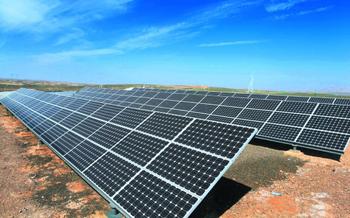 Recent reports indicate that the National Energy Administration is currently working on a "Renewable Energy Heating Implementation Plan." This initiative aims to boost heating solutions using renewable energy sources such as solar, geothermal, and biomass. The plan is expected to be officially launched within this year, with a focus on scaling up these technologies across the country. According to an early draft, by 2015, renewable energy could replace about 50 million tons of standard coal in power generation, and by 2020, this number is projected to reach 100 million tons. Currently, the industry has already surpassed 30 million tons of equivalent coal displacement.
The plan also emphasizes a strategic shift in the light and heat industry, moving from residential applications toward large-scale engineering projects. While the current market is dominated by solar water heaters, the new direction encourages broader adoption of renewable energy systems for industrial and commercial use. To support this transition, the government is offering subsidies, tax incentives, and other policy measures aimed at promoting energy efficiency and reducing emissions.
According to data from Zero2IPO, between 2006 and 2012, there were 272 investment cases in China's new energy sector, with 221 of them disclosing specific investment amounts totaling $5.796 billion. The year 2009 saw the highest level of investment in history, while 2010 matched the peak seen in 2011. However, the following years showed a sharp fluctuation—investment dropped significantly in 2012 due to the ongoing economic slowdown, falling back to levels not seen since 2007. The decline was nearly 50%, and the number of investments also dropped sharply, returning to 2008 levels.
Despite these challenges, the photovoltaic industry is now entering a phase where both internal and external pressures are pushing for innovation and efficiency. The development of the solar energy sector presents a new opportunity for growth, especially as the industry moves toward engineering-scale power generation. Policy support and technological advancements are playing a key role in expanding the engineering market.
Many provinces and cities have introduced policies requiring the "universal design and uniform installation" of solar hot water systems, effectively turning what was once a voluntary measure into a mandatory requirement. These policies are likely to remain in place in the future, ensuring continued growth in the sector. Meanwhile, technological progress has overcome previous limitations, such as the inability to install solar panels on high-rise buildings. This has enabled greater integration of solar technology into building designs, further driving the expansion of the engineering market.
With strong policy backing and continuous innovation, the future of the light and heat industry looks promising, setting the stage for sustainable and large-scale development.
Recent reports indicate that the National Energy Administration is currently working on a "Renewable Energy Heating Implementation Plan." This initiative aims to boost heating solutions using renewable energy sources such as solar, geothermal, and biomass. The plan is expected to be officially launched within this year, with a focus on scaling up these technologies across the country. According to an early draft, by 2015, renewable energy could replace about 50 million tons of standard coal in power generation, and by 2020, this number is projected to reach 100 million tons. Currently, the industry has already surpassed 30 million tons of equivalent coal displacement.
The plan also emphasizes a strategic shift in the light and heat industry, moving from residential applications toward large-scale engineering projects. While the current market is dominated by solar water heaters, the new direction encourages broader adoption of renewable energy systems for industrial and commercial use. To support this transition, the government is offering subsidies, tax incentives, and other policy measures aimed at promoting energy efficiency and reducing emissions.
According to data from Zero2IPO, between 2006 and 2012, there were 272 investment cases in China's new energy sector, with 221 of them disclosing specific investment amounts totaling $5.796 billion. The year 2009 saw the highest level of investment in history, while 2010 matched the peak seen in 2011. However, the following years showed a sharp fluctuation—investment dropped significantly in 2012 due to the ongoing economic slowdown, falling back to levels not seen since 2007. The decline was nearly 50%, and the number of investments also dropped sharply, returning to 2008 levels.
Despite these challenges, the photovoltaic industry is now entering a phase where both internal and external pressures are pushing for innovation and efficiency. The development of the solar energy sector presents a new opportunity for growth, especially as the industry moves toward engineering-scale power generation. Policy support and technological advancements are playing a key role in expanding the engineering market.
Many provinces and cities have introduced policies requiring the "universal design and uniform installation" of solar hot water systems, effectively turning what was once a voluntary measure into a mandatory requirement. These policies are likely to remain in place in the future, ensuring continued growth in the sector. Meanwhile, technological progress has overcome previous limitations, such as the inability to install solar panels on high-rise buildings. This has enabled greater integration of solar technology into building designs, further driving the expansion of the engineering market.
With strong policy backing and continuous innovation, the future of the light and heat industry looks promising, setting the stage for sustainable and large-scale development.Aluminium/Steel 2.4mm Series Blind Rivets
TIANCHANG FASTENER SYSTEM CO..LTD , https://www.toprivet.com